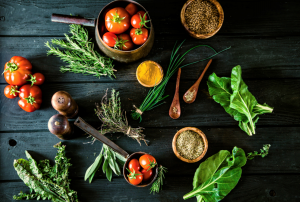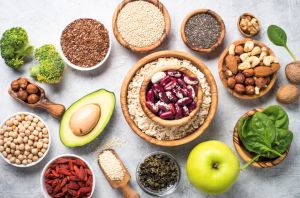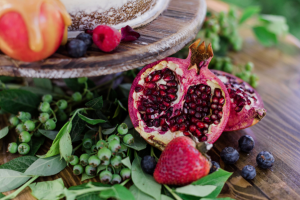30 Dec Do you eat enough plant based foods?
The New Year is upon us, and so too are New Year’s resolutions! Often people make the aim to eat healthier in each New Year, but aren’t specific enough about what this looks like to give it the best chance of success. Head over to our Setting Nutrition Goals blog (CLICK HERE) to learn about how to set good goals/intentions if this is something you want to learn more about.
One way to make ‘healthier eating’ more achievable is to specify healthy eating looks like for you or the particular change being made to work towards the overall goal of ‘healthy eating’. A simple change that can quickly make a diet healthier is to include a diverse range of plant based foods in your weekly diet.

It has been shown by the American Gut Project that eating 30 varieties of plant foods leads to better health outcomes. This is primarily from the modification of the gut microbiome, which is the bacteria and other microorganisms that are found in our gut. A healthier and more diverse gut microbiome can lead to not only better overall health, but also improved mood, reduced inflammation, a well-supported immune system and lowered risk of diseases, such as diabetes, inflammatory bowel disease, heart disease and colon cancer.
Keep in mind that there are 6 types of plant based foods: fruit, vegetables, wholegrains, legumes, nuts and seeds.

It is easy to get ourselves into a routine, purchasing the same food at the weekly shop and preparing the identical recipes throughout the week. However, consuming a wide variety of plant foods increases the range of nutrients in your diet, as each will contain different nutritional offerings. For example, orange coloured fruits and vegetables contain Vitamin A, which plays an important role in eye health and assisting our immune system. On the other hand, leafy green vegetables contain Vitamin K, a key player in blood clotting.
So, how do we go about eating 30 different plant foods in a week?
A great first step is write out a list as the week goes by to determine how many different types of plant foods you are currently eating, you may even be surprised by how many you already eat!

Once you know how many you currently eat, you can start thinking about how to include more in your week:
- Consider adding 1-2 different plant based foods per week, it doesn’t have to be done all at once!
- Order produce box services so that you are given a range of produce in season. Check out our blog about Seasonal Eating (CLICK HERE) for some suggestions
- Utilise smoothies! Add some hidden vegetables into smoothies, such as frozen zucchini or spinach – you won’t even notice them in there. Nuts and seeds can also easily be added to a smoothie to add some healthy fats and an additional variety of plant based foods
- Snack on some cut up vegetables throughout the day. Include a hummus dip to not only add some protein to this snack (which will help keep you full), but also provides an additional plant based source in the form of legumes (chickpeas)
- Utilise frozen vegetables, you certainly don’t need to feel as though fresh vegetables are the only option
- Try different types of pasta – such as lentil, pea or chickpea for some variety
- Enhance your pasta sauces by grating a variety of vegetables into them, such as zucchini, mushrooms or carrot
- Reduce the meat component in pasta sauces or curries and replace with lentils
- There are lots of easy plant based snacks at the supermarket now. Canned chickpeas are a great snack or addition to a salad. You can also purchase packets of roasted chickpeas or fav-va beans to snack on during the day
- Try to choose multi-grain products where you can see the grains and seeds throughout. Brown rice and pasta are also simple swaps you can make to include more wholegrains in your diet
- Sprinkle some nuts or seeds to your salad for some crunch!
The introduction of variety into your weekly diet will hopefully bring about more excitement with your food. If you are wanting personalised advice with this process, our dietitian Alex offers both in person and Telehealth appointments.
References:
American Gut Project – https://pubmed.ncbi.nlm.nih.gov/29795809/


